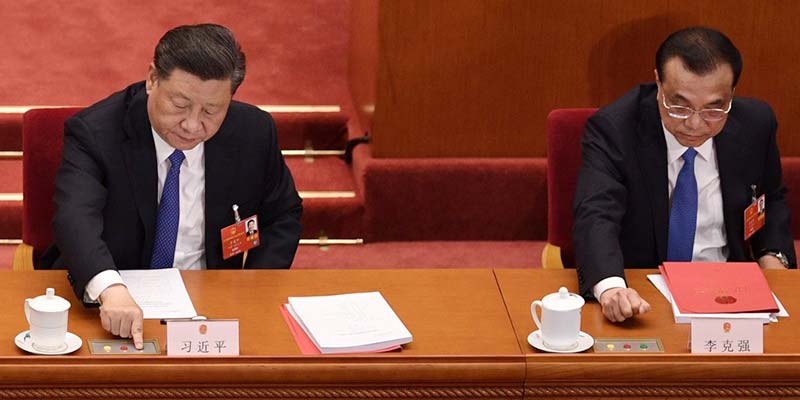- World
- May 28
China passes Hong Kong security Bill
China’s parliament approved a decision on May 28 to go forward with national security legislation for Hong Kong that democracy activists in the city and Western countries fear could jeopardise its special autonomy and freedoms.
China says the legislation will be aimed at tackling secession, subversion, terrorism and foreign interference in the city but the plan, unveiled in Beijing last week, triggered the first big protests in Hong Kong for months.
The Bill now passes to the Standing Committee of the Communist Party and could become law by August.
Riot police were out in force in Hong Kong as its legislators debated another piece of legislation, a Bill that would criminalise disrespect of China’s national anthem, while the US piled on pressure aimed at preserving the city’s autonomy.
Members of China’s parliament, the National People’s Congress, in the Great Hall of the People to the west of Beijing’s Tiananmen Square burst into prolonged applause when the vote tally showed 2,878 to one in favour of the decision to move forward with legislation, with six abstentions.
Details of the law are expected to be drawn up in coming weeks. Chinese authorities and the Beijing-backed government in Hong Kong say there is no threat to the city’s autonomy and the new law would be tightly focused.
“The law will not affect the rights and freedoms enjoyed by Hong Kong residents,” the city's Beijing-backed leader Carrie Lam said in a statement welcoming the Chinese parliament’s vote. The city government would fully cooperate with Beijing to “complete the relevant legislative work as early as possible”, she said.
Despite the assurances, the US, Britain and the European Union have expressed concern about the security legislation and its implications for China's freest city and one of the world's financial hubs.
‘Hong Kong no longer autonomous from China’
US Secretary of State Mike Pompeo described China’s announcement to tighten its control over Hong Kong as unilateral, arbitrary and disastrous, saying the former British colony no longer qualifies to be considered as autonomous under mainland China.
Hong Kong, an economic powerhouse, is a Special Administrative Region (SAR) of China. It has observed a ‘one country, two systems’ policy since Britain returned sovereignty to China on July 1, 1997, which has allowed it certain freedoms the rest of China does not have.
The US over the last few days has expressed concerns over the new Chinese law on Hong Kong and has indicated taking steps against it.
In a statement, notifying the US Congress, Pompeo said Hong Kong does not continue to warrant treatment under US laws in the same manner as US laws were applied to Hong Kong before July 1997.
The top American diplomat said that he took this decision after carefully studying developments as the State Department is required by the Hong Kong Policy Act to assess the autonomy of the territory from China.
“No reasonable person can assert today that Hong Kong maintains a high degree of autonomy from China, given facts on the ground,” he said.
The security law could see Chinese intelligence agencies set up bases in the city. Relations between the two superpowers have been tense over China’s claims in the South China Sea and trade. The coronavirus pandemic has also become an issue of acrimony.
US President Donald Trump has promised action over Hong Kong, with an announcement at the end of the week. More than 1,300 US companies have offices in the city, providing about 100,000 jobs.
China said it would take necessary countermeasures to any foreign interference into what it insists are its internal affairs.
Trump’s possible response could include visa and economic sanctions, David Stilwell, the State Department’s assistant secretary for East Asia, said.
Manorama Yearbook app is now available on Google Play Store and iOS App Store

